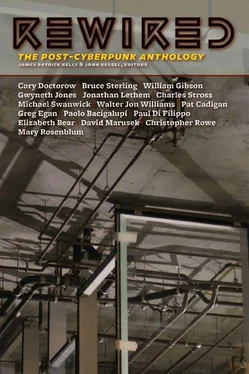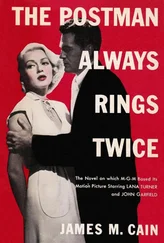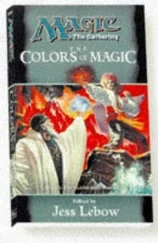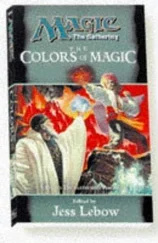“Your friend is right,” Gloriana said. “There is a small archway hidden behind yon tapestry. Go through it. Place your hand on the left wall and run. If you turn whichever way you must to keep from letting go of the wall, it will lead you outside. You are both rogues, I see, and doubtless deserve punishment, yet I can find nothing in my heart for you but friendship.”
“Madame…” Darger began, deeply moved.
“Go! My bridegroom enters.”
The door began to fall inward. With a final cry of “Farewell!” from Darger and “Come on! ” from Surplus, they sped away.
By the time they had found their way outside, all of Buckingham Labyrinth was in flames. The demon, however, did not emerge from the flames, encouraging them to believe that when the modem it carried finally melted down, it had been forced to return to that unholy realm from whence it came.
The sky was red with flames as the sloop set sail for Calais. Leaning against the rail, watching, Surplus shook his head. “What a terrible sight! I cannot help feeling, in part, responsible.”
“Come! Come!” Darger said. “This dyspepsia ill becomes you. We are both rich fellows, now. The Lady Pamela’s diamonds will maintain us lavishly for years to come. As for London, this is far from the first fire it has had to endure. Nor will it be the last. Life is short, and so, while we live, let us be jolly.”
“These are strange words for a melancholiac,” Surplus said wonderingly.
“In triumph, my mind turns its face to the sun. Dwell not on the past, dear friend, but on the future that lies glittering before us.”
“The necklace is worthless,” Surplus said. “Now that I have the leisure to examine it, free of the distracting flesh of Lady Pamela, I see that these are not diamonds, but mere imitations.” He made to cast the necklace into the Thames.
Before he could, though, Darger snatched away the stones from him and studied them closely. Then he threw back his head and laughed. “The biters bit! Well, it may be paste, but it looks valuable still. We shall find good use for it in Paris.”
“We are going to Paris?”
“We are partners, are we not? Remember that antique wisdom that whenever a door closes, another opens. For every city that burns, another beckons. To France, then, and adventure! After which, Italy, the Vatican Empire, Austro-Hungary, perhaps even Russia! Never forget that we have yet to present your credentials to the Duke of Muscovy.”
“Very well,” Surplus said. “But when we do, I’ll pick out the modem.”
Sterling to Kessel, 12 June 1985:
“My feeling is that the time has passed in which SF, in its predictive mode, can successfully utter jeremiads and point out the hazards in the road ahead. This has now become a pointless act from which all meaning has been drained, for the simple fact that the road ahead is almost nothing but hazards. To create a successful work of fiction — one that will penetrate the protective shell of numbness surrounding the reader — it is necessary to give up pointing at potholes and instead attempt to search out whatever is left of the road.”
“Lobsters” is about the freedom that comes from continuous, disruptive change, the effort of societal structures to resist that change, and the human élan that attempts to evade constriction.
The fatal moment for a CP hero is when he has children. There are few children in CP stories, and fewer families. Heaven forbid that you might father or bear a child.
Whereas ′80s CP sees the marketplace as a destructive force, Stross is in tune with a ′90s embrace of entrepreneurial capitalism. The future is bright — even for digital lobsters.
* * *
Manfred’s on the road again, making strangers rich.
It’s a hot summer Tuesday and he’s standing in the plaza in front of the Centraal Station with his eyeballs powered up and the sunlight jangling off the canal, motor scooters and kamikaze cyclists whizzing past and tourists chattering on every side. The square smells of water and dirt and hot metal and the fart-laden exhaust fumes of cold catalytic converters; the bells of trams ding in the background and birds flock overhead. He glances up and grabs a pigeon, crops it and squirts at his website to show he’s arrived. The bandwidth is good here, he realizes; and it’s not just the bandwidth, it’s the whole scene. Amsterdam is making him feel wanted already, even though he’s fresh off the train from Schiphol: he’s infected with the dynamic optimism of another time zone, another city. If the mood holds, someone out there is going to become very rich indeed.
He wonders who it’s going to be.
Manfred sits on a stool out in the car park at the Brouwerij ’t IJ, watching the articulated buses go by and drinking a third of a liter of lip-curlingly sour geuze. His channels are jabbering away in a corner of his head-up display, throwing compressed infobursts of filtered press releases at him. They compete for his attention, bickering and rudely waving in front of the scenery. A couple of punks — maybe local, but more likely drifters lured to Amsterdam by the magnetic field of tolerance the Dutch beam across Europe like a pulsar — are laughing and chatting by a couple of battered mopeds in the far corner. A tourist boat putters by in the canal; the sails of the huge windmill overhead cast long cool shadows across the road. The windmill is a machine for lifting water, turning wind power into dry land: trading energy for space, sixteenth-century style. Manfred is waiting for an invite to a party where he’s going to meet a man who he can talk to about trading energy for space, twenty-first century style, and forget about his personal problems.
He’s ignoring the instant messenger boxes, enjoying some low bandwidth high sensation time with his beer and the pigeons, when a woman walks up to him and says his name: “Manfred Macx?”
He glances up. The courier is an Effective Cyclist, all wind-burned smooth-running muscles clad in a paen to polymer technology: electric blue lycra and wasp-yellow carbonate with a light speckling of anti-collision LEDS and tight-packed air bags. She holds out a box for him. He pauses a moment, struck by the degree to which she resembles Pam, his ex-fiancée.
“I’m Macx,” he says, waving the back of his left wrist under her barcode reader. “Who’s it from?”
“FedEx.” The voice isn’t Pam. She dumps the box in his lap, then she’s back over the low wall and onto her bicycle with her phone already chirping, disappearing in a cloud of spread-spectrum emissions.
Manfred turns the box over in his hands: it’s a disposable supermarket phone, paid for in cash: cheap, untraceable and efficient. It can even do conference calls, which makes it the tool of choice for spooks and grifters everywhere.
The box rings. Manfred rips the cover open and pulls out the phone, mildly annoyed. “Yes, who is this?”
The voice at the other end has a heavy Russian accent, almost a parody in this decade of cheap online translation services. “Manfred. Am please to meet you; wish to personalize interface, make friends, no? Have much to offer.”
“Who are you?” Manfred repeats suspiciously.
“Am organization formerly known as KGB dot RU.”
“I think your translator’s broken.” He holds the phone to his ear carefully, as if it’s made of smoke-thin aerogel, tenuous as the sanity of the being on the other end of the line.
“Nyet — no, sorry. Am apologize for we not use commercial translation software.
Interpreters are ideologically suspect, mostly have capitalist semiotics and pay-per-use APIs. Must implement English more better, yes?”
Читать дальше












